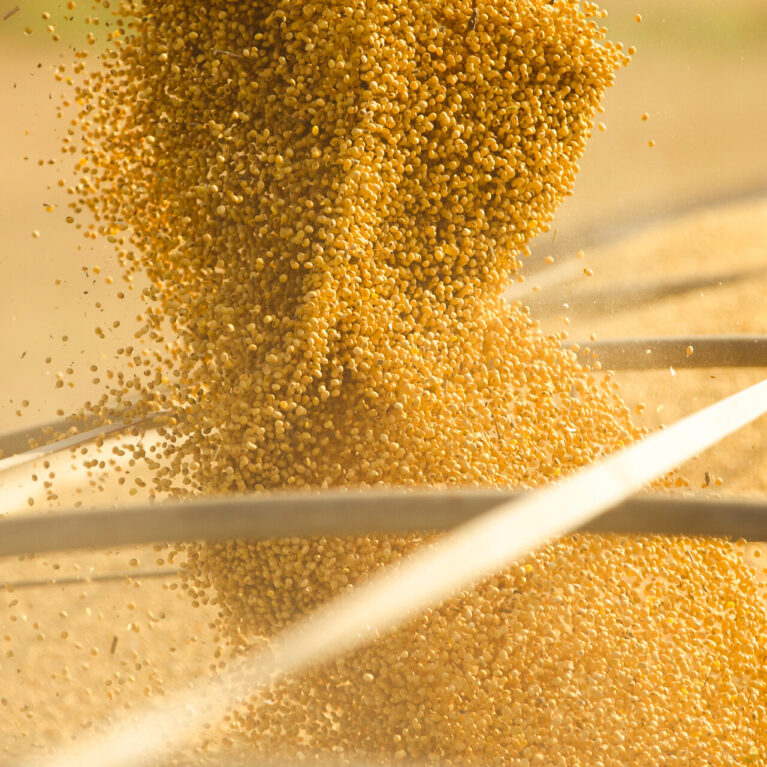
Who exactly is the first purchaser?
The entity that first buys the soybeans from a farmer.
Why does the first purchaser have to pay the checkoff assessment?
Through the checkoff, soybean farmers contribute one-half of 1 percent (.005) of the price of each bushel at the first point of sale for farmer-driven research and promotional activities to maximize profit opportunities. The federal Soybean Promotion, Research and Consumer Information Act (SPARC) requires the assessment to be collected by the first purchaser and reported quarterly.
Do I assess the 1/2 of 1% (.005) before or after discounts, storage and drying costs?
The net value of the soybean is calculated after quality discounts have been taken including moisture or quality grade. Other fees such as storage, trucking, and drying are services provided by the elevator and are deducted after the assessment has been calculated.
Who sets the percentage that is collected by first purchasers from the soybean farmers?
This was established at the federal level by the United States Department of Agriculture. The states do not have the ability to adjust the percentage collected.
Where does the money go that is collected and submitted to the Western Region Soybean Board (WRSB)?
The funds are split evenly between the WRSB and the United Soybean Board (USB). The funds are used for research, education, domestic and foreign markets, including new uses for soybeans and soybean products.
Who should the assessment check be payable to?
Checks are made payable to the Western Region Soybean Board.
What are the deadlines for submitting the forms/checks?
All assessment forms/checks are to be submitted to the NSB office as follows:
| Soybean Purchases Made Between | Remit Checkoff Funds By |
|---|---|
| January 1 – March 31 | April 30 |
| April 1 – June 30 | July 31 |
| July 1 – September 30 | October 31 |
| October 1 – December 31 | January 31 |
Is there a penalty for submitting the assessment form/check late?
Yes, if the checkoff assessment was not postmarked by a first purchaser by the due date, the entity remitting must be charged a late fee of 2 percent for each month that they are late in remitting. The late fee is compounded monthly until paid.
Does a first purchaser need to submit the form if soybeans were not purchased during that quarter?
Yes. Although no soybeans were purchased, you must still submit the form and list “zero” and sign/date by the deadline.
What about soybeans I buy that were raised in another state?
First Purchasers will be required to collect on out-of-state soybeans just as they would on in-state soybeans as this is a national program. Because this is a national program, such soybeans are to be listed by state-of-origin on the remittance reports. State-of-origin is the state in which the soybeans were grown.
What if I don’t collect from the grower?
This is a federal law and funds must be collected. First Purchasers who do not collect the assessments or producers who do not pay will be in violation and subject to a civil penalty of not more than $1,100 for each violation and an additional penalty for willful failure to pay equal to the amount of such assessment.
What if we purchase soybeans from the first purchaser who has already deducted the checkoff?
It is up to the seller to prove the soybeans have already been checked off. You may have them fill out a Non-Producer Status Form (LS-48) for your justification during an audit performed by the Nebraska Public Service Commission.
Is anyone exempt from the assessment fee?
All first purchasers are required to collect and report the assessment fee unless the farmer is 100 percent organic and has filed papers stipulating, they grow organic soybeans on a certified organic farm.
Certification of Non-Producer Status Form LS-48
Form LS-48 must be completed by a seller to prove the soybeans have already been checked off. This form is to be filled out and kept on file for justification when the first purchaser is audited by the Nebraska Public Service Commission.
Can a producer get a refund on his soybean checkoff?
As of October 1, 1995 refunds from the National checkoff were eliminated.
